Analyzing Poverty: Comparing Biblical Teachings with Author's Views
VerifiedAdded on 2023/06/10
|8
|2640
|203
Essay
AI Summary
This essay explores the issue of poverty through the lens of biblical verses and the author's religious worldview, highlighting key differences and similarities between the two perspectives. The analysis reveals that while the Bible emphasizes God's concern for the poor and calls for self-sacrifice to alleviate poverty, the author's worldview focuses on poverty as a source of suffering (Dukkha) and advocates for compassion and generosity. The essay also notes that both approaches share a common ground in promoting love and overcoming hate, ultimately emphasizing the importance of helping those in need. Desklib provides access to this and many other solved assignments for students.
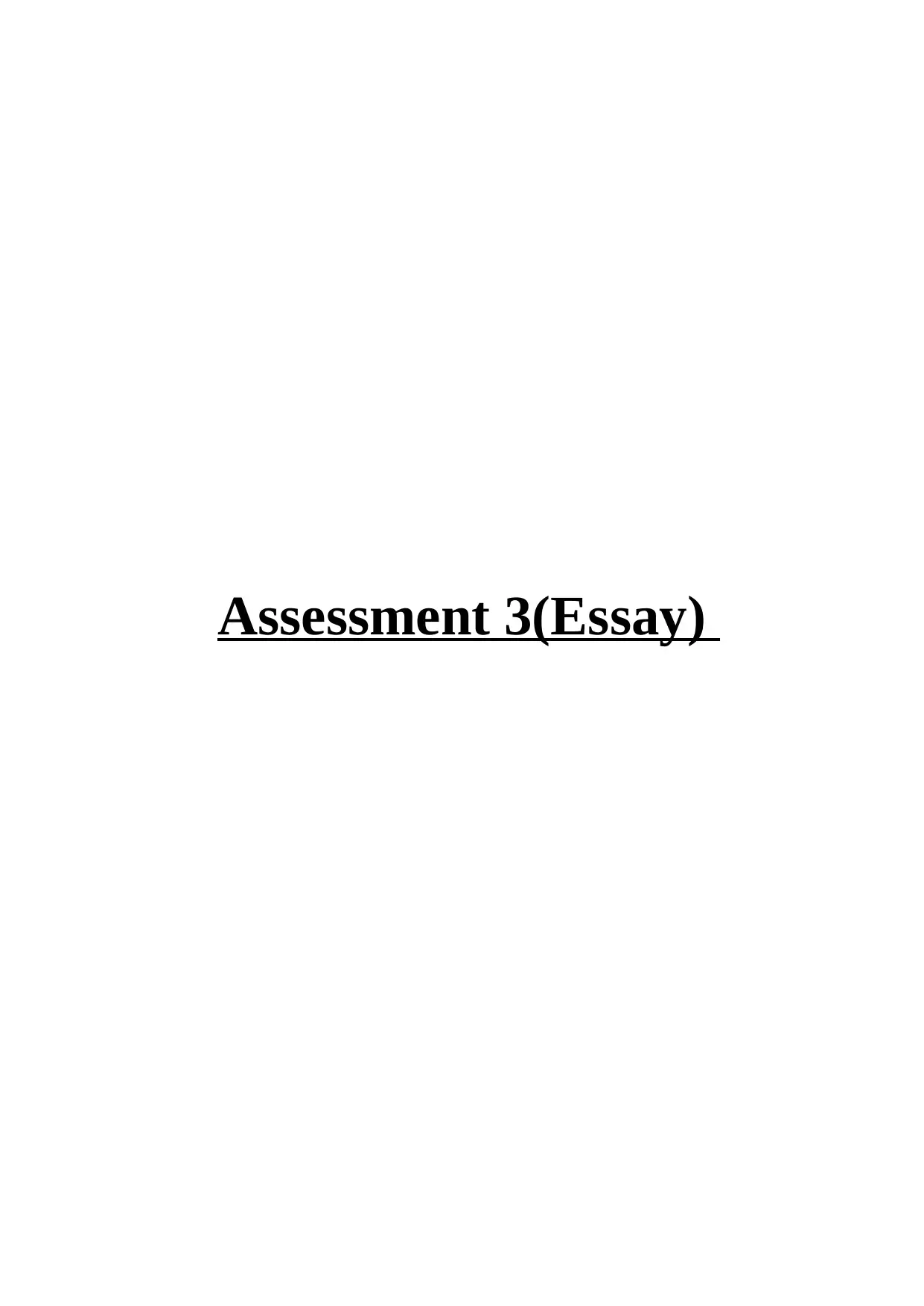
Assessment 3(Essay)
Paraphrase This Document
Need a fresh take? Get an instant paraphrase of this document with our AI Paraphraser
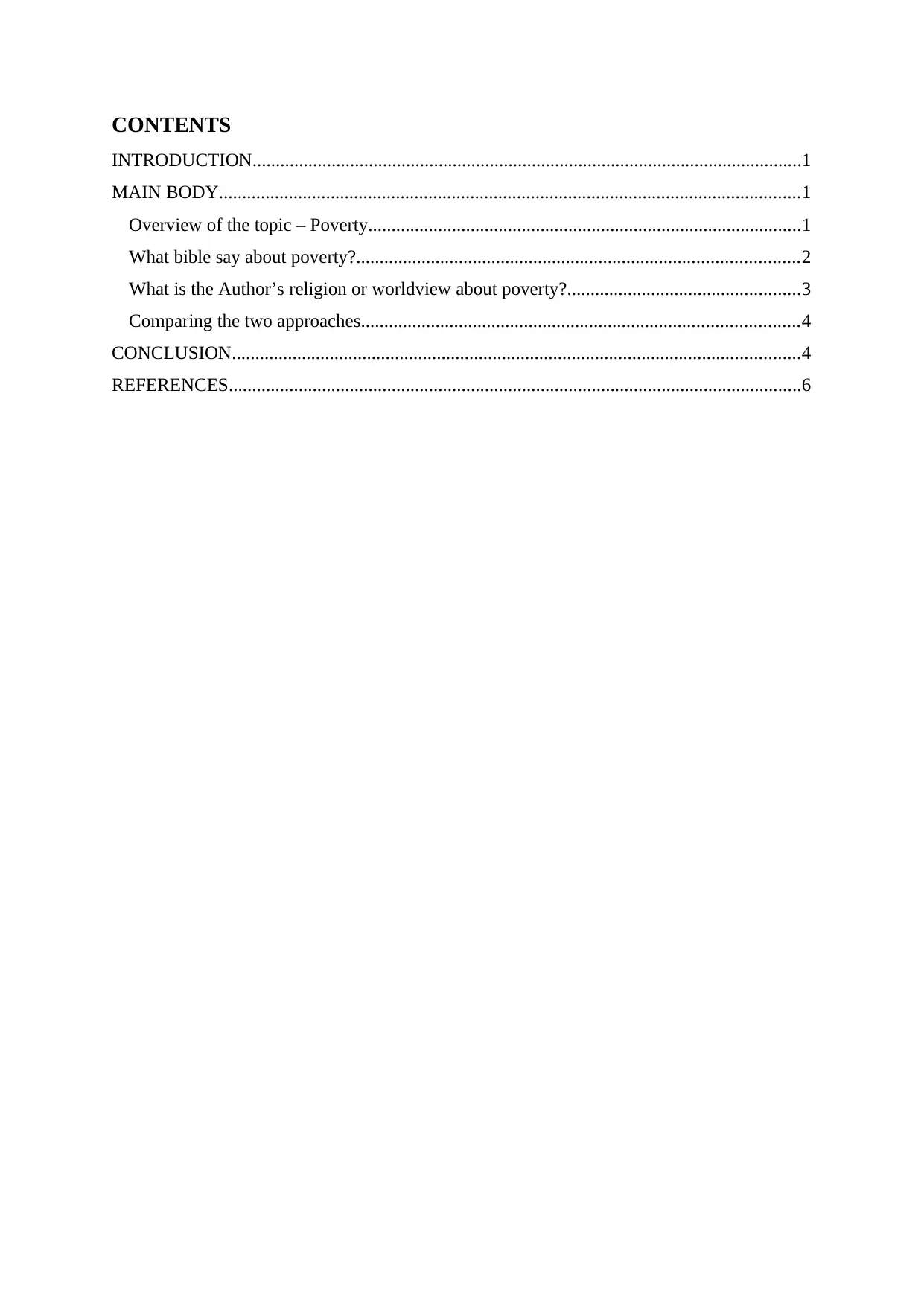
CONTENTS
INTRODUCTION......................................................................................................................1
MAIN BODY.............................................................................................................................1
Overview of the topic – Poverty.............................................................................................1
What bible say about poverty?...............................................................................................2
What is the Author’s religion or worldview about poverty?..................................................3
Comparing the two approaches..............................................................................................4
CONCLUSION..........................................................................................................................4
REFERENCES...........................................................................................................................6
INTRODUCTION......................................................................................................................1
MAIN BODY.............................................................................................................................1
Overview of the topic – Poverty.............................................................................................1
What bible say about poverty?...............................................................................................2
What is the Author’s religion or worldview about poverty?..................................................3
Comparing the two approaches..............................................................................................4
CONCLUSION..........................................................................................................................4
REFERENCES...........................................................................................................................6
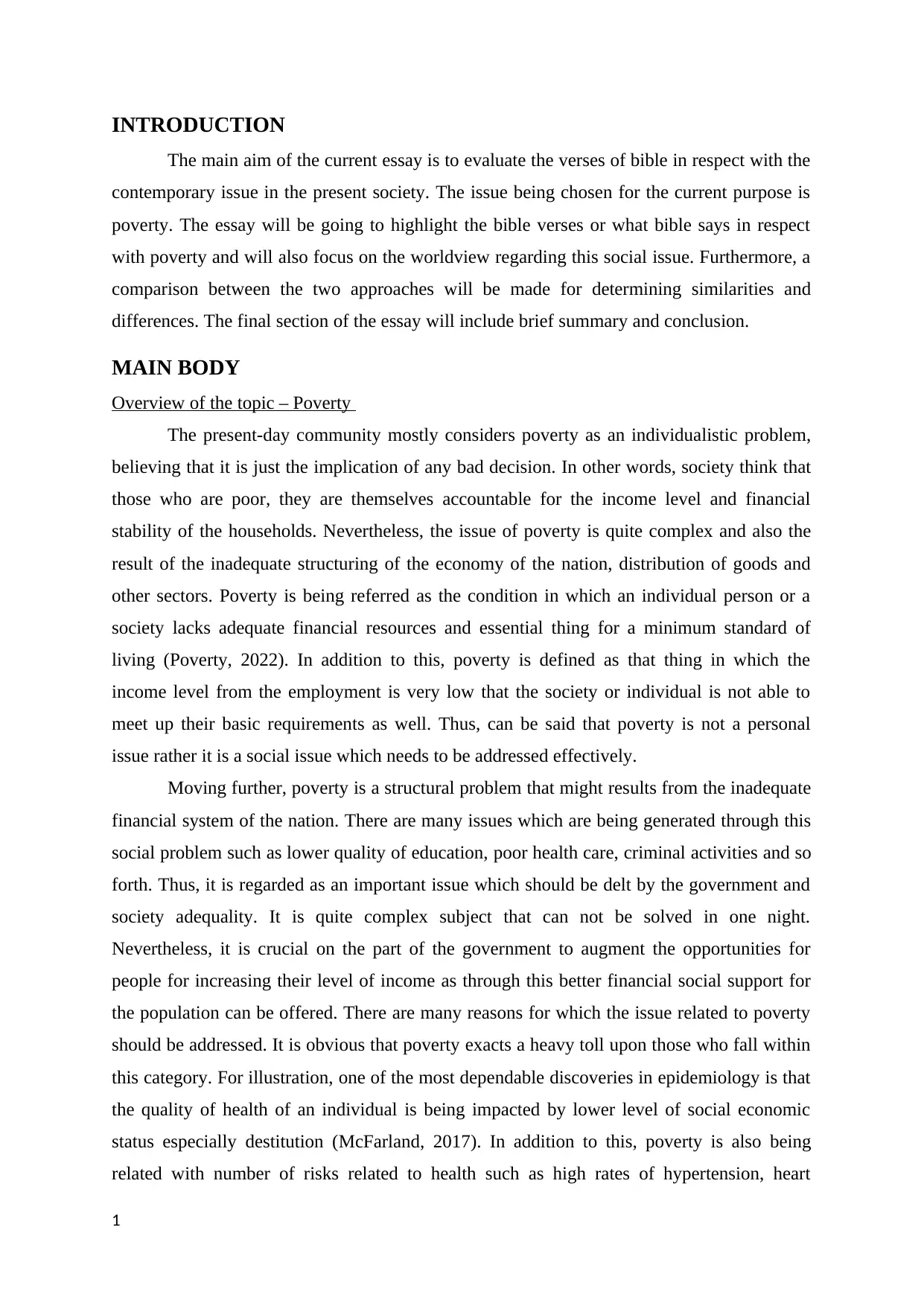
INTRODUCTION
The main aim of the current essay is to evaluate the verses of bible in respect with the
contemporary issue in the present society. The issue being chosen for the current purpose is
poverty. The essay will be going to highlight the bible verses or what bible says in respect
with poverty and will also focus on the worldview regarding this social issue. Furthermore, a
comparison between the two approaches will be made for determining similarities and
differences. The final section of the essay will include brief summary and conclusion.
MAIN BODY
Overview of the topic – Poverty
The present-day community mostly considers poverty as an individualistic problem,
believing that it is just the implication of any bad decision. In other words, society think that
those who are poor, they are themselves accountable for the income level and financial
stability of the households. Nevertheless, the issue of poverty is quite complex and also the
result of the inadequate structuring of the economy of the nation, distribution of goods and
other sectors. Poverty is being referred as the condition in which an individual person or a
society lacks adequate financial resources and essential thing for a minimum standard of
living (Poverty, 2022). In addition to this, poverty is defined as that thing in which the
income level from the employment is very low that the society or individual is not able to
meet up their basic requirements as well. Thus, can be said that poverty is not a personal
issue rather it is a social issue which needs to be addressed effectively.
Moving further, poverty is a structural problem that might results from the inadequate
financial system of the nation. There are many issues which are being generated through this
social problem such as lower quality of education, poor health care, criminal activities and so
forth. Thus, it is regarded as an important issue which should be delt by the government and
society adequality. It is quite complex subject that can not be solved in one night.
Nevertheless, it is crucial on the part of the government to augment the opportunities for
people for increasing their level of income as through this better financial social support for
the population can be offered. There are many reasons for which the issue related to poverty
should be addressed. It is obvious that poverty exacts a heavy toll upon those who fall within
this category. For illustration, one of the most dependable discoveries in epidemiology is that
the quality of health of an individual is being impacted by lower level of social economic
status especially destitution (McFarland, 2017). In addition to this, poverty is also being
related with number of risks related to health such as high rates of hypertension, heart
1
The main aim of the current essay is to evaluate the verses of bible in respect with the
contemporary issue in the present society. The issue being chosen for the current purpose is
poverty. The essay will be going to highlight the bible verses or what bible says in respect
with poverty and will also focus on the worldview regarding this social issue. Furthermore, a
comparison between the two approaches will be made for determining similarities and
differences. The final section of the essay will include brief summary and conclusion.
MAIN BODY
Overview of the topic – Poverty
The present-day community mostly considers poverty as an individualistic problem,
believing that it is just the implication of any bad decision. In other words, society think that
those who are poor, they are themselves accountable for the income level and financial
stability of the households. Nevertheless, the issue of poverty is quite complex and also the
result of the inadequate structuring of the economy of the nation, distribution of goods and
other sectors. Poverty is being referred as the condition in which an individual person or a
society lacks adequate financial resources and essential thing for a minimum standard of
living (Poverty, 2022). In addition to this, poverty is defined as that thing in which the
income level from the employment is very low that the society or individual is not able to
meet up their basic requirements as well. Thus, can be said that poverty is not a personal
issue rather it is a social issue which needs to be addressed effectively.
Moving further, poverty is a structural problem that might results from the inadequate
financial system of the nation. There are many issues which are being generated through this
social problem such as lower quality of education, poor health care, criminal activities and so
forth. Thus, it is regarded as an important issue which should be delt by the government and
society adequality. It is quite complex subject that can not be solved in one night.
Nevertheless, it is crucial on the part of the government to augment the opportunities for
people for increasing their level of income as through this better financial social support for
the population can be offered. There are many reasons for which the issue related to poverty
should be addressed. It is obvious that poverty exacts a heavy toll upon those who fall within
this category. For illustration, one of the most dependable discoveries in epidemiology is that
the quality of health of an individual is being impacted by lower level of social economic
status especially destitution (McFarland, 2017). In addition to this, poverty is also being
related with number of risks related to health such as high rates of hypertension, heart
1
⊘ This is a preview!⊘
Do you want full access?
Subscribe today to unlock all pages.

Trusted by 1+ million students worldwide
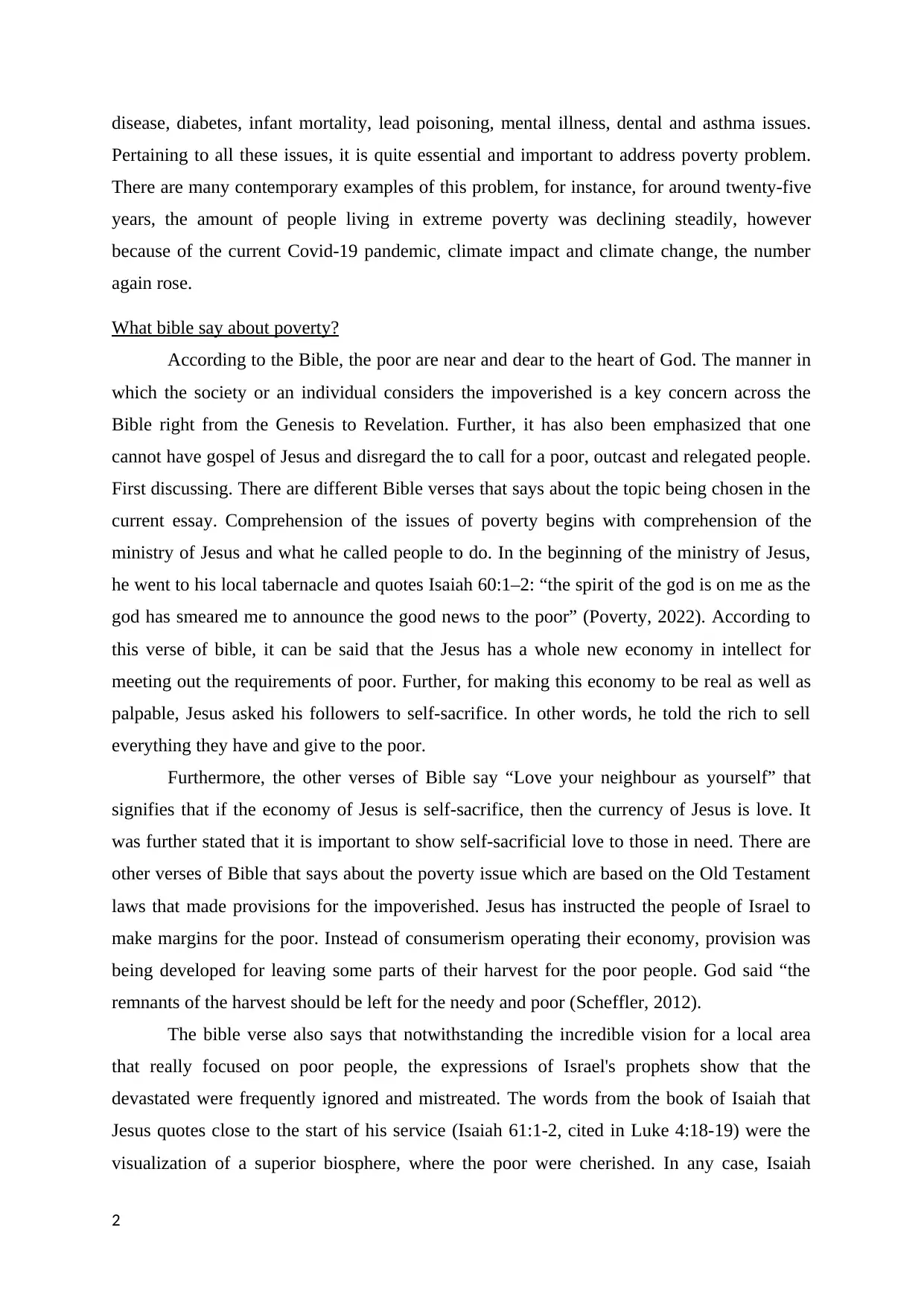
disease, diabetes, infant mortality, lead poisoning, mental illness, dental and asthma issues.
Pertaining to all these issues, it is quite essential and important to address poverty problem.
There are many contemporary examples of this problem, for instance, for around twenty-five
years, the amount of people living in extreme poverty was declining steadily, however
because of the current Covid-19 pandemic, climate impact and climate change, the number
again rose.
What bible say about poverty?
According to the Bible, the poor are near and dear to the heart of God. The manner in
which the society or an individual considers the impoverished is a key concern across the
Bible right from the Genesis to Revelation. Further, it has also been emphasized that one
cannot have gospel of Jesus and disregard the to call for a poor, outcast and relegated people.
First discussing. There are different Bible verses that says about the topic being chosen in the
current essay. Comprehension of the issues of poverty begins with comprehension of the
ministry of Jesus and what he called people to do. In the beginning of the ministry of Jesus,
he went to his local tabernacle and quotes Isaiah 60:1–2: “the spirit of the god is on me as the
god has smeared me to announce the good news to the poor” (Poverty, 2022). According to
this verse of bible, it can be said that the Jesus has a whole new economy in intellect for
meeting out the requirements of poor. Further, for making this economy to be real as well as
palpable, Jesus asked his followers to self-sacrifice. In other words, he told the rich to sell
everything they have and give to the poor.
Furthermore, the other verses of Bible say “Love your neighbour as yourself” that
signifies that if the economy of Jesus is self-sacrifice, then the currency of Jesus is love. It
was further stated that it is important to show self-sacrificial love to those in need. There are
other verses of Bible that says about the poverty issue which are based on the Old Testament
laws that made provisions for the impoverished. Jesus has instructed the people of Israel to
make margins for the poor. Instead of consumerism operating their economy, provision was
being developed for leaving some parts of their harvest for the poor people. God said “the
remnants of the harvest should be left for the needy and poor (Scheffler, 2012).
The bible verse also says that notwithstanding the incredible vision for a local area
that really focused on poor people, the expressions of Israel's prophets show that the
devastated were frequently ignored and mistreated. The words from the book of Isaiah that
Jesus quotes close to the start of his service (Isaiah 61:1-2, cited in Luke 4:18-19) were the
visualization of a superior biosphere, where the poor were cherished. In any case, Isaiah
2
Pertaining to all these issues, it is quite essential and important to address poverty problem.
There are many contemporary examples of this problem, for instance, for around twenty-five
years, the amount of people living in extreme poverty was declining steadily, however
because of the current Covid-19 pandemic, climate impact and climate change, the number
again rose.
What bible say about poverty?
According to the Bible, the poor are near and dear to the heart of God. The manner in
which the society or an individual considers the impoverished is a key concern across the
Bible right from the Genesis to Revelation. Further, it has also been emphasized that one
cannot have gospel of Jesus and disregard the to call for a poor, outcast and relegated people.
First discussing. There are different Bible verses that says about the topic being chosen in the
current essay. Comprehension of the issues of poverty begins with comprehension of the
ministry of Jesus and what he called people to do. In the beginning of the ministry of Jesus,
he went to his local tabernacle and quotes Isaiah 60:1–2: “the spirit of the god is on me as the
god has smeared me to announce the good news to the poor” (Poverty, 2022). According to
this verse of bible, it can be said that the Jesus has a whole new economy in intellect for
meeting out the requirements of poor. Further, for making this economy to be real as well as
palpable, Jesus asked his followers to self-sacrifice. In other words, he told the rich to sell
everything they have and give to the poor.
Furthermore, the other verses of Bible say “Love your neighbour as yourself” that
signifies that if the economy of Jesus is self-sacrifice, then the currency of Jesus is love. It
was further stated that it is important to show self-sacrificial love to those in need. There are
other verses of Bible that says about the poverty issue which are based on the Old Testament
laws that made provisions for the impoverished. Jesus has instructed the people of Israel to
make margins for the poor. Instead of consumerism operating their economy, provision was
being developed for leaving some parts of their harvest for the poor people. God said “the
remnants of the harvest should be left for the needy and poor (Scheffler, 2012).
The bible verse also says that notwithstanding the incredible vision for a local area
that really focused on poor people, the expressions of Israel's prophets show that the
devastated were frequently ignored and mistreated. The words from the book of Isaiah that
Jesus quotes close to the start of his service (Isaiah 61:1-2, cited in Luke 4:18-19) were the
visualization of a superior biosphere, where the poor were cherished. In any case, Isaiah
2
Paraphrase This Document
Need a fresh take? Get an instant paraphrase of this document with our AI Paraphraser
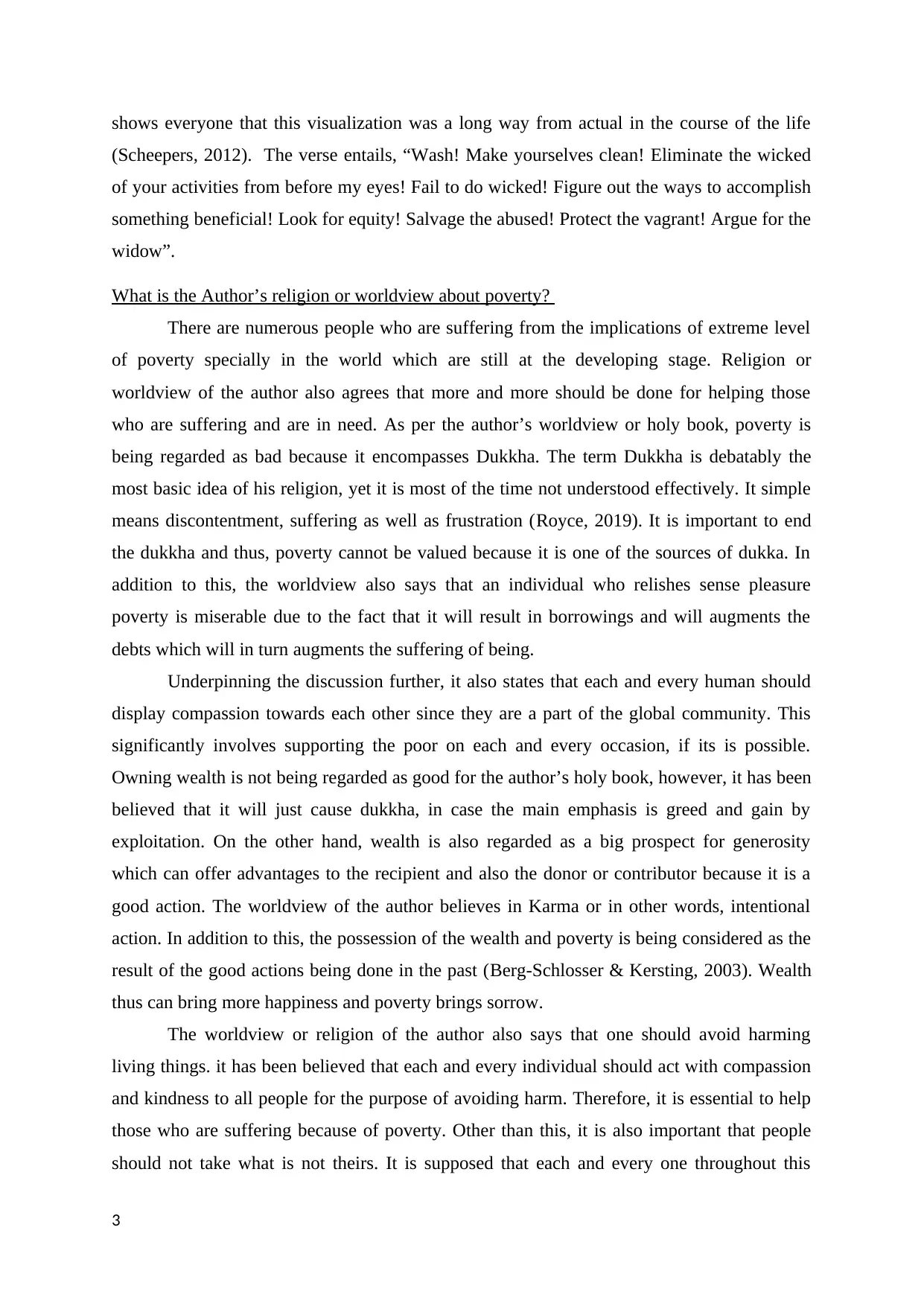
shows everyone that this visualization was a long way from actual in the course of the life
(Scheepers, 2012). The verse entails, “Wash! Make yourselves clean! Eliminate the wicked
of your activities from before my eyes! Fail to do wicked! Figure out the ways to accomplish
something beneficial! Look for equity! Salvage the abused! Protect the vagrant! Argue for the
widow”.
What is the Author’s religion or worldview about poverty?
There are numerous people who are suffering from the implications of extreme level
of poverty specially in the world which are still at the developing stage. Religion or
worldview of the author also agrees that more and more should be done for helping those
who are suffering and are in need. As per the author’s worldview or holy book, poverty is
being regarded as bad because it encompasses Dukkha. The term Dukkha is debatably the
most basic idea of his religion, yet it is most of the time not understood effectively. It simple
means discontentment, suffering as well as frustration (Royce, 2019). It is important to end
the dukkha and thus, poverty cannot be valued because it is one of the sources of dukka. In
addition to this, the worldview also says that an individual who relishes sense pleasure
poverty is miserable due to the fact that it will result in borrowings and will augments the
debts which will in turn augments the suffering of being.
Underpinning the discussion further, it also states that each and every human should
display compassion towards each other since they are a part of the global community. This
significantly involves supporting the poor on each and every occasion, if its is possible.
Owning wealth is not being regarded as good for the author’s holy book, however, it has been
believed that it will just cause dukkha, in case the main emphasis is greed and gain by
exploitation. On the other hand, wealth is also regarded as a big prospect for generosity
which can offer advantages to the recipient and also the donor or contributor because it is a
good action. The worldview of the author believes in Karma or in other words, intentional
action. In addition to this, the possession of the wealth and poverty is being considered as the
result of the good actions being done in the past (Berg-Schlosser & Kersting, 2003). Wealth
thus can bring more happiness and poverty brings sorrow.
The worldview or religion of the author also says that one should avoid harming
living things. it has been believed that each and every individual should act with compassion
and kindness to all people for the purpose of avoiding harm. Therefore, it is essential to help
those who are suffering because of poverty. Other than this, it is also important that people
should not take what is not theirs. It is supposed that each and every one throughout this
3
(Scheepers, 2012). The verse entails, “Wash! Make yourselves clean! Eliminate the wicked
of your activities from before my eyes! Fail to do wicked! Figure out the ways to accomplish
something beneficial! Look for equity! Salvage the abused! Protect the vagrant! Argue for the
widow”.
What is the Author’s religion or worldview about poverty?
There are numerous people who are suffering from the implications of extreme level
of poverty specially in the world which are still at the developing stage. Religion or
worldview of the author also agrees that more and more should be done for helping those
who are suffering and are in need. As per the author’s worldview or holy book, poverty is
being regarded as bad because it encompasses Dukkha. The term Dukkha is debatably the
most basic idea of his religion, yet it is most of the time not understood effectively. It simple
means discontentment, suffering as well as frustration (Royce, 2019). It is important to end
the dukkha and thus, poverty cannot be valued because it is one of the sources of dukka. In
addition to this, the worldview also says that an individual who relishes sense pleasure
poverty is miserable due to the fact that it will result in borrowings and will augments the
debts which will in turn augments the suffering of being.
Underpinning the discussion further, it also states that each and every human should
display compassion towards each other since they are a part of the global community. This
significantly involves supporting the poor on each and every occasion, if its is possible.
Owning wealth is not being regarded as good for the author’s holy book, however, it has been
believed that it will just cause dukkha, in case the main emphasis is greed and gain by
exploitation. On the other hand, wealth is also regarded as a big prospect for generosity
which can offer advantages to the recipient and also the donor or contributor because it is a
good action. The worldview of the author believes in Karma or in other words, intentional
action. In addition to this, the possession of the wealth and poverty is being considered as the
result of the good actions being done in the past (Berg-Schlosser & Kersting, 2003). Wealth
thus can bring more happiness and poverty brings sorrow.
The worldview or religion of the author also says that one should avoid harming
living things. it has been believed that each and every individual should act with compassion
and kindness to all people for the purpose of avoiding harm. Therefore, it is essential to help
those who are suffering because of poverty. Other than this, it is also important that people
should not take what is not theirs. It is supposed that each and every one throughout this
3
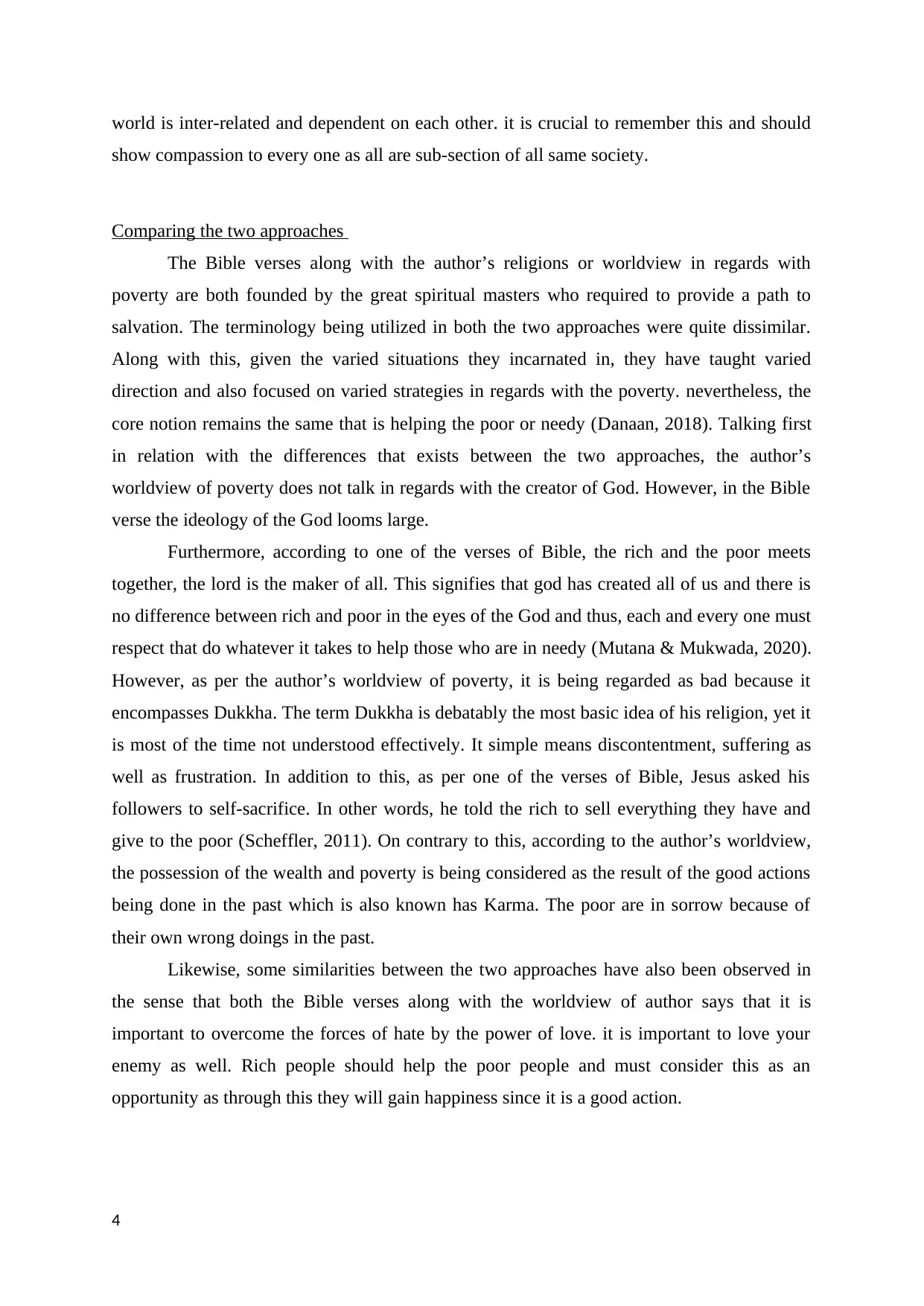
world is inter-related and dependent on each other. it is crucial to remember this and should
show compassion to every one as all are sub-section of all same society.
Comparing the two approaches
The Bible verses along with the author’s religions or worldview in regards with
poverty are both founded by the great spiritual masters who required to provide a path to
salvation. The terminology being utilized in both the two approaches were quite dissimilar.
Along with this, given the varied situations they incarnated in, they have taught varied
direction and also focused on varied strategies in regards with the poverty. nevertheless, the
core notion remains the same that is helping the poor or needy (Danaan, 2018). Talking first
in relation with the differences that exists between the two approaches, the author’s
worldview of poverty does not talk in regards with the creator of God. However, in the Bible
verse the ideology of the God looms large.
Furthermore, according to one of the verses of Bible, the rich and the poor meets
together, the lord is the maker of all. This signifies that god has created all of us and there is
no difference between rich and poor in the eyes of the God and thus, each and every one must
respect that do whatever it takes to help those who are in needy (Mutana & Mukwada, 2020).
However, as per the author’s worldview of poverty, it is being regarded as bad because it
encompasses Dukkha. The term Dukkha is debatably the most basic idea of his religion, yet it
is most of the time not understood effectively. It simple means discontentment, suffering as
well as frustration. In addition to this, as per one of the verses of Bible, Jesus asked his
followers to self-sacrifice. In other words, he told the rich to sell everything they have and
give to the poor (Scheffler, 2011). On contrary to this, according to the author’s worldview,
the possession of the wealth and poverty is being considered as the result of the good actions
being done in the past which is also known has Karma. The poor are in sorrow because of
their own wrong doings in the past.
Likewise, some similarities between the two approaches have also been observed in
the sense that both the Bible verses along with the worldview of author says that it is
important to overcome the forces of hate by the power of love. it is important to love your
enemy as well. Rich people should help the poor people and must consider this as an
opportunity as through this they will gain happiness since it is a good action.
4
show compassion to every one as all are sub-section of all same society.
Comparing the two approaches
The Bible verses along with the author’s religions or worldview in regards with
poverty are both founded by the great spiritual masters who required to provide a path to
salvation. The terminology being utilized in both the two approaches were quite dissimilar.
Along with this, given the varied situations they incarnated in, they have taught varied
direction and also focused on varied strategies in regards with the poverty. nevertheless, the
core notion remains the same that is helping the poor or needy (Danaan, 2018). Talking first
in relation with the differences that exists between the two approaches, the author’s
worldview of poverty does not talk in regards with the creator of God. However, in the Bible
verse the ideology of the God looms large.
Furthermore, according to one of the verses of Bible, the rich and the poor meets
together, the lord is the maker of all. This signifies that god has created all of us and there is
no difference between rich and poor in the eyes of the God and thus, each and every one must
respect that do whatever it takes to help those who are in needy (Mutana & Mukwada, 2020).
However, as per the author’s worldview of poverty, it is being regarded as bad because it
encompasses Dukkha. The term Dukkha is debatably the most basic idea of his religion, yet it
is most of the time not understood effectively. It simple means discontentment, suffering as
well as frustration. In addition to this, as per one of the verses of Bible, Jesus asked his
followers to self-sacrifice. In other words, he told the rich to sell everything they have and
give to the poor (Scheffler, 2011). On contrary to this, according to the author’s worldview,
the possession of the wealth and poverty is being considered as the result of the good actions
being done in the past which is also known has Karma. The poor are in sorrow because of
their own wrong doings in the past.
Likewise, some similarities between the two approaches have also been observed in
the sense that both the Bible verses along with the worldview of author says that it is
important to overcome the forces of hate by the power of love. it is important to love your
enemy as well. Rich people should help the poor people and must consider this as an
opportunity as through this they will gain happiness since it is a good action.
4
⊘ This is a preview!⊘
Do you want full access?
Subscribe today to unlock all pages.

Trusted by 1+ million students worldwide
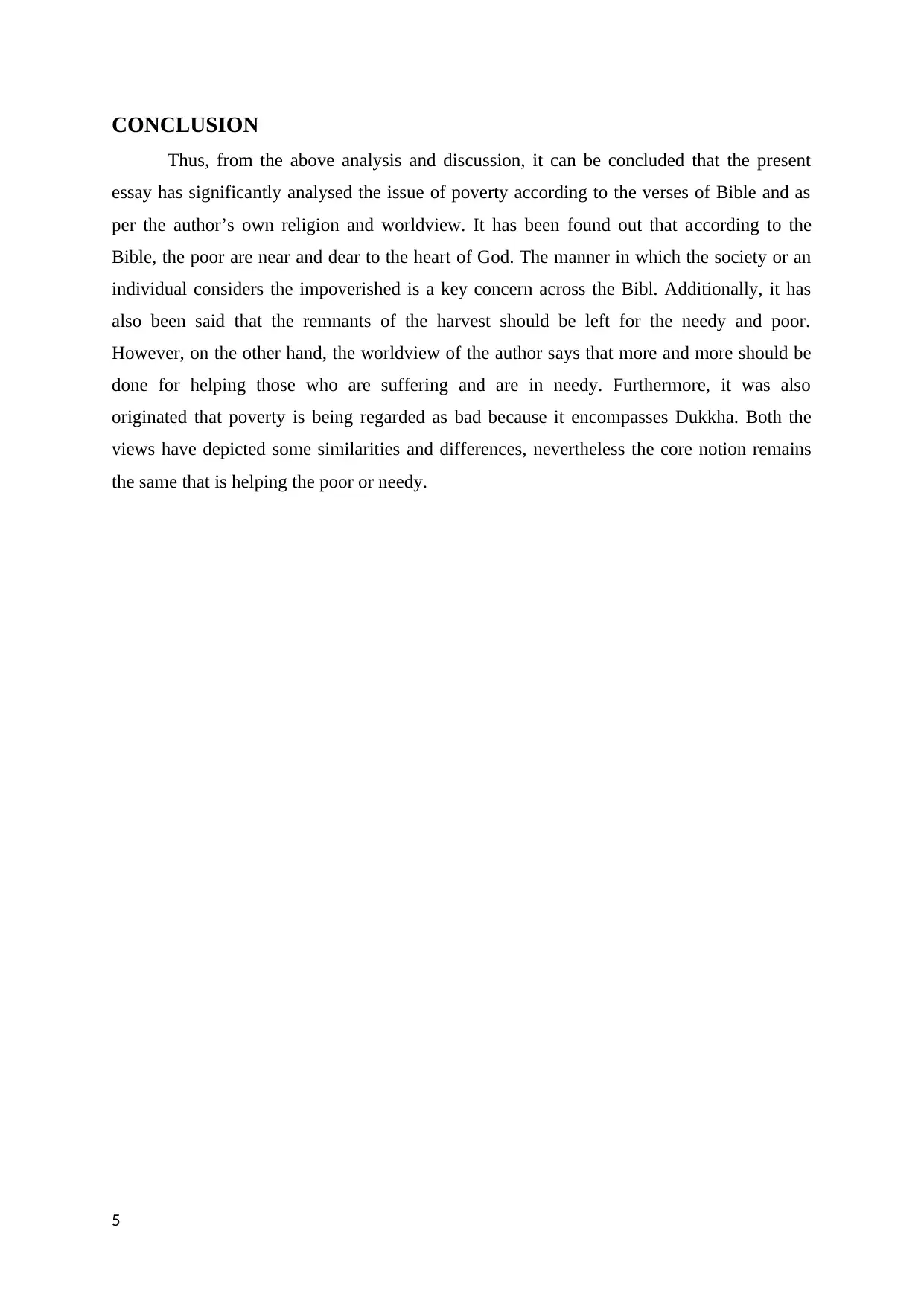
CONCLUSION
Thus, from the above analysis and discussion, it can be concluded that the present
essay has significantly analysed the issue of poverty according to the verses of Bible and as
per the author’s own religion and worldview. It has been found out that according to the
Bible, the poor are near and dear to the heart of God. The manner in which the society or an
individual considers the impoverished is a key concern across the Bibl. Additionally, it has
also been said that the remnants of the harvest should be left for the needy and poor.
However, on the other hand, the worldview of the author says that more and more should be
done for helping those who are suffering and are in needy. Furthermore, it was also
originated that poverty is being regarded as bad because it encompasses Dukkha. Both the
views have depicted some similarities and differences, nevertheless the core notion remains
the same that is helping the poor or needy.
5
Thus, from the above analysis and discussion, it can be concluded that the present
essay has significantly analysed the issue of poverty according to the verses of Bible and as
per the author’s own religion and worldview. It has been found out that according to the
Bible, the poor are near and dear to the heart of God. The manner in which the society or an
individual considers the impoverished is a key concern across the Bibl. Additionally, it has
also been said that the remnants of the harvest should be left for the needy and poor.
However, on the other hand, the worldview of the author says that more and more should be
done for helping those who are suffering and are in needy. Furthermore, it was also
originated that poverty is being regarded as bad because it encompasses Dukkha. Both the
views have depicted some similarities and differences, nevertheless the core notion remains
the same that is helping the poor or needy.
5
Paraphrase This Document
Need a fresh take? Get an instant paraphrase of this document with our AI Paraphraser
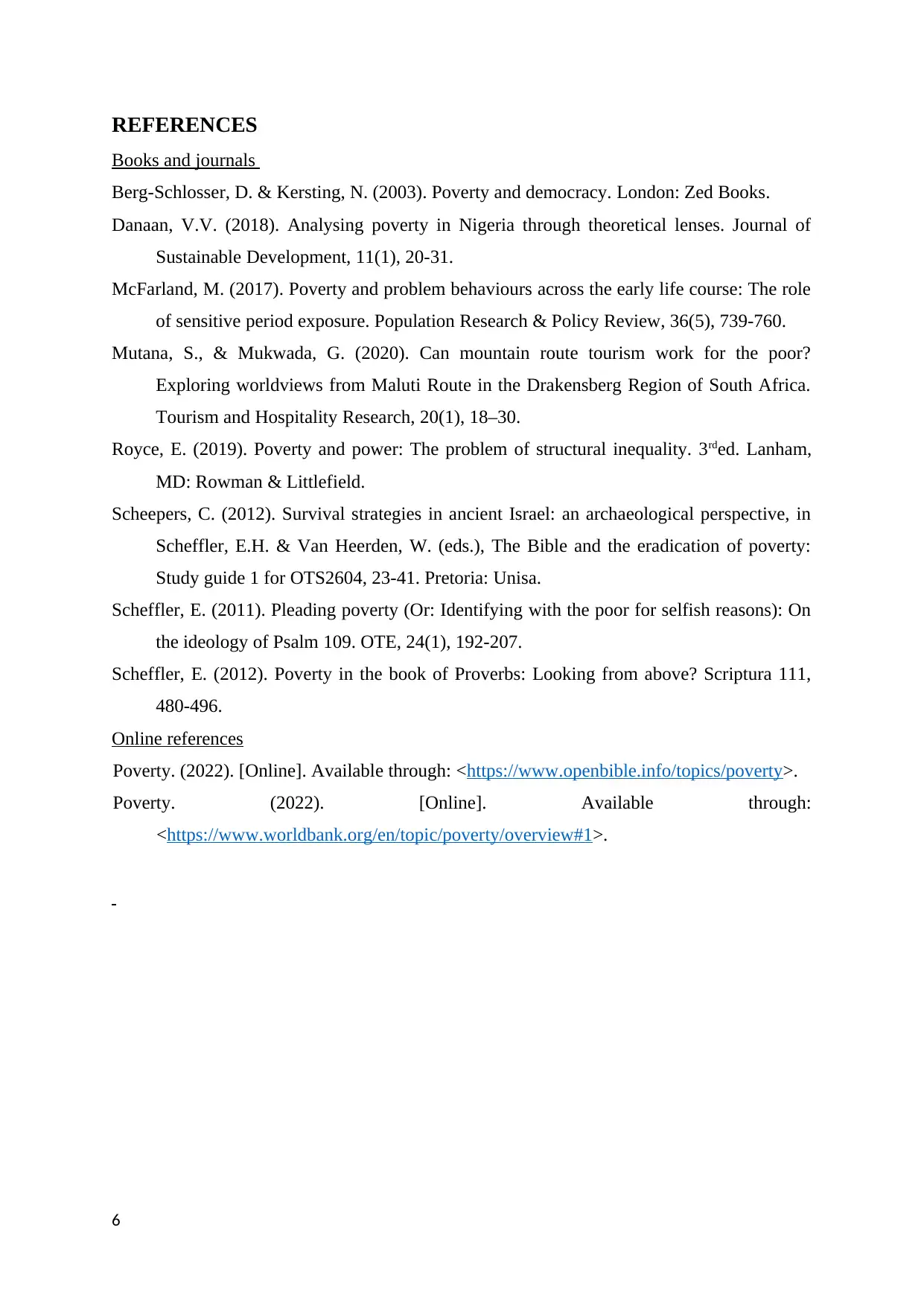
REFERENCES
Books and journals
Berg-Schlosser, D. & Kersting, N. (2003). Poverty and democracy. London: Zed Books.
Danaan, V.V. (2018). Analysing poverty in Nigeria through theoretical lenses. Journal of
Sustainable Development, 11(1), 20-31.
McFarland, M. (2017). Poverty and problem behaviours across the early life course: The role
of sensitive period exposure. Population Research & Policy Review, 36(5), 739-760.
Mutana, S., & Mukwada, G. (2020). Can mountain route tourism work for the poor?
Exploring worldviews from Maluti Route in the Drakensberg Region of South Africa.
Tourism and Hospitality Research, 20(1), 18–30.
Royce, E. (2019). Poverty and power: The problem of structural inequality. 3rded. Lanham,
MD: Rowman & Littlefield.
Scheepers, C. (2012). Survival strategies in ancient Israel: an archaeological perspective, in
Scheffler, E.H. & Van Heerden, W. (eds.), The Bible and the eradication of poverty:
Study guide 1 for OTS2604, 23-41. Pretoria: Unisa.
Scheffler, E. (2011). Pleading poverty (Or: Identifying with the poor for selfish reasons): On
the ideology of Psalm 109. OTE, 24(1), 192-207.
Scheffler, E. (2012). Poverty in the book of Proverbs: Looking from above? Scriptura 111,
480-496.
Online references
Poverty. (2022). [Online]. Available through: <https://www.openbible.info/topics/poverty>.
Poverty. (2022). [Online]. Available through:
<https://www.worldbank.org/en/topic/poverty/overview#1>.
6
Books and journals
Berg-Schlosser, D. & Kersting, N. (2003). Poverty and democracy. London: Zed Books.
Danaan, V.V. (2018). Analysing poverty in Nigeria through theoretical lenses. Journal of
Sustainable Development, 11(1), 20-31.
McFarland, M. (2017). Poverty and problem behaviours across the early life course: The role
of sensitive period exposure. Population Research & Policy Review, 36(5), 739-760.
Mutana, S., & Mukwada, G. (2020). Can mountain route tourism work for the poor?
Exploring worldviews from Maluti Route in the Drakensberg Region of South Africa.
Tourism and Hospitality Research, 20(1), 18–30.
Royce, E. (2019). Poverty and power: The problem of structural inequality. 3rded. Lanham,
MD: Rowman & Littlefield.
Scheepers, C. (2012). Survival strategies in ancient Israel: an archaeological perspective, in
Scheffler, E.H. & Van Heerden, W. (eds.), The Bible and the eradication of poverty:
Study guide 1 for OTS2604, 23-41. Pretoria: Unisa.
Scheffler, E. (2011). Pleading poverty (Or: Identifying with the poor for selfish reasons): On
the ideology of Psalm 109. OTE, 24(1), 192-207.
Scheffler, E. (2012). Poverty in the book of Proverbs: Looking from above? Scriptura 111,
480-496.
Online references
Poverty. (2022). [Online]. Available through: <https://www.openbible.info/topics/poverty>.
Poverty. (2022). [Online]. Available through:
<https://www.worldbank.org/en/topic/poverty/overview#1>.
6
1 out of 8
Related Documents
Your All-in-One AI-Powered Toolkit for Academic Success.
+13062052269
info@desklib.com
Available 24*7 on WhatsApp / Email
![[object Object]](/_next/static/media/star-bottom.7253800d.svg)
Unlock your academic potential
Copyright © 2020–2025 A2Z Services. All Rights Reserved. Developed and managed by ZUCOL.




